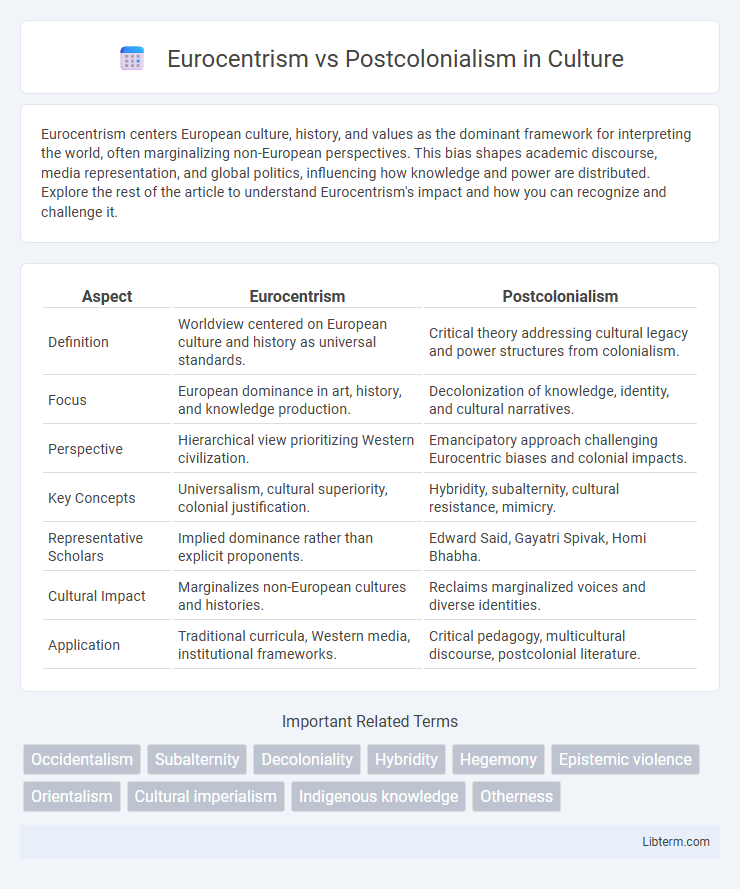Eurocentrism centers European culture, history, and values as the dominant framework for interpreting the world, often marginalizing non-European perspectives. This bias shapes academic discourse, media representation, and global politics, influencing how knowledge and power are distributed. Explore the rest of the article to understand Eurocentrism's impact and how you can recognize and challenge it.
Table of Comparison
| Aspect | Eurocentrism | Postcolonialism |
|---|---|---|
| Definition | Worldview centered on European culture and history as universal standards. | Critical theory addressing cultural legacy and power structures from colonialism. |
| Focus | European dominance in art, history, and knowledge production. | Decolonization of knowledge, identity, and cultural narratives. |
| Perspective | Hierarchical view prioritizing Western civilization. | Emancipatory approach challenging Eurocentric biases and colonial impacts. |
| Key Concepts | Universalism, cultural superiority, colonial justification. | Hybridity, subalternity, cultural resistance, mimicry. |
| Representative Scholars | Implied dominance rather than explicit proponents. | Edward Said, Gayatri Spivak, Homi Bhabha. |
| Cultural Impact | Marginalizes non-European cultures and histories. | Reclaims marginalized voices and diverse identities. |
| Application | Traditional curricula, Western media, institutional frameworks. | Critical pedagogy, multicultural discourse, postcolonial literature. |
Understanding Eurocentrism: Definition and Origins
Eurocentrism refers to the worldview that centers European culture, history, and values as universally dominant and superior, often marginalizing non-European perspectives and contributions. Originating during the Age of Exploration and colonial expansion, Eurocentrism solidified through Enlightenment philosophies and imperialist ideologies that justified European dominance. This framework shapes knowledge production, historical narratives, and cultural representations that prioritize European experiences while obscuring diverse global realities.
Key Features of Eurocentric Perspectives
Eurocentric perspectives prioritize European history, culture, and values as the universal norm, often marginalizing non-European societies and knowledge systems. This viewpoint emphasizes European superiority through the lens of colonial power, framing global developments as extensions of European progress and civilization. Key features include the privileging of Western epistemologies, the disregard for indigenous and non-Western narratives, and the justification of colonialism as a civilizing mission.
Postcolonialism: Emergence and Core Principles
Postcolonialism emerged as a critical response to Eurocentrism by challenging the dominance of Western narratives and emphasizing the perspectives of formerly colonized societies. It centers on concepts such as cultural hybridity, subalternity, and decolonization of knowledge, aiming to dismantle the lingering effects of colonial power structures. Key figures like Edward Said, Gayatri Spivak, and Homi K. Bhabha articulate postcolonial theory's commitment to critiquing imperial discourse and advocating for epistemic justice.
Critiques of Eurocentrism in Modern Scholarship
Critiques of Eurocentrism in modern scholarship emphasize its tendency to marginalize non-Western histories and epistemologies, perpetuating a biased worldview that privileges European cultural norms and knowledge systems. Postcolonial theory challenges this dominance by advocating for the inclusion of diverse perspectives from formerly colonized regions, highlighting the interconnectedness of global histories and power structures. Scholars such as Edward Said and Gayatri Spivak expose how Eurocentric frameworks sustain colonial legacies within academic disciplines, urging a decentering of Western narratives to foster a more equitable and pluralistic understanding of history and culture.
Colonial Legacies and Their Ongoing Impacts
Colonial legacies embedded in Eurocentrism shape global power dynamics by privileging Western narratives and marginalizing Indigenous histories. Postcolonialism critically examines these impacts, revealing how colonial economic exploitation, cultural domination, and political subjugation persist in contemporary inequities. The ongoing effects include systemic racism, economic disparities, and cultural erasure in formerly colonized societies, necessitating decolonial approaches for equitable knowledge production and policy reforms.
Major Theorists in Postcolonial Thought
Major theorists in postcolonial thought include Edward Said, whose concept of Orientalism critiques Eurocentric representations of the East as exotic and inferior, challenging Western dominance in knowledge production. Frantz Fanon analyzes the psychological and cultural impacts of colonialism on both colonizers and colonized, emphasizing decolonization as a necessary process of reclaiming identity. Homi K. Bhabha introduces the idea of hybridity, highlighting the complex interactions between colonizer and colonized cultures, disrupting fixed binaries established by Eurocentric narratives.
Case Studies: Eurocentrism in History and Literature
Eurocentrism in history and literature is evident through case studies such as the portrayal of non-European societies as primitive or exotic, reinforcing Western superiority. Classic historical narratives like those surrounding the Age of Exploration often marginalize indigenous perspectives, while literary canons frequently prioritize European authors and themes, overshadowing diverse voices. Postcolonial critiques challenge these Eurocentric frameworks by highlighting the significant cultural, social, and political contributions of formerly colonized regions and advocating for more inclusive historiographies and literary representations.
Postcolonial Responses to Eurocentric Narratives
Postcolonial responses to Eurocentric narratives critically challenge the dominance of Western perspectives by highlighting the histories, cultures, and identities marginalised during colonial rule. Scholars like Edward Said, Gayatri Chakravorty Spivak, and Homi K. Bhabha expose how Eurocentrism perpetuates cultural imperialism and advocate for decolonizing knowledge through alternative epistemologies. These responses promote a plurality of voices and counter-narratives that resist homogenizing colonial legacies and emphasize indigenous agency and hybridity.
Decolonizing Education and Knowledge Production
Eurocentrism in education prioritizes Western perspectives, often marginalizing non-Western knowledge systems and histories, which perpetuates colonial dominance in knowledge production. Postcolonialism challenges this by advocating for the decolonization of curricula through the inclusion of indigenous epistemologies and diverse cultural narratives, aiming to democratize knowledge and empower previously silenced voices. Decolonizing education promotes critical reflection on power structures within academia and fosters an inclusive environment where multiple ways of knowing coexist and enrich global understanding.
Future Directions: Reconciling Eurocentrism and Postcolonialism
Future directions in reconciling Eurocentrism and postcolonialism involve critically re-evaluating historical narratives to integrate diverse perspectives from formerly colonized societies. Emphasizing decolonial frameworks promotes inclusivity by challenging dominant Eurocentric paradigms in academia, culture, and politics. Innovative interdisciplinary approaches seek to bridge theoretical divides, fostering mutual understanding and equitable knowledge production globally.
Eurocentrism Infographic

 libterm.com
libterm.com